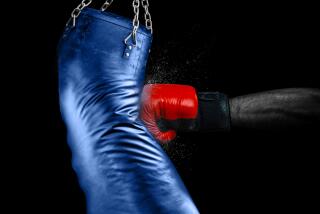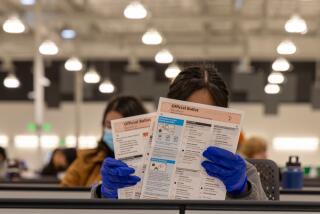Politics, Wired
SACRAMENTO — The stage chosen by Arnold Schwarzenegger to announce his gubernatorial candidacy -- “The Tonight Show With Jay Leno” -- was the coup de grace for me. The atmosphere surrounding the recall election had deteriorated into a political circus. When a Times reporter asked me to answer the rising chorus of laughter and mockery directed at California, I threw my towel into the ring. This time, the Golden State had gone over the top. I couldn’t defend it any longer.
But I’m now retrieving my towel. The circus has become a grand opera. Giuseppe Verdi’s “La Forza del Destino,” perhaps, with its brooding sense of destiny. Or Richard Wagner’s “Lohengrin,” in which a solitary knight takes on the forces of evil. Had Sen. Dianne Feinstein chosen to run, we might even have had Giacomo Puccini’s “Turandot,” with its rich suggestions of womanly political power.
Yes, Schwarzenegger’s entry into the race was unorthodox, but he is a formidable political figure, as are Cruz Bustamante, Arianna Huffington, Bill Simon, Peter Ueberroth, Tom McClintock and Peter Camejo. Collectively, they suggest how rich our political resources are; in a real way, their candidacies honor California. They cannot be easily blasted into oblivion by negative television ads, as happened to former Mayor Richard Riordan in the 2002 Republican primary. Even if a candidate engages in what state Atty. Gen. Bill Lockyer has described as “puke politics,” California voters don’t seem in the mood to buy it. Something powerfully transformative is underway in state politics, and it is nothing less than voters’ self-liberation from a claustrophobic and demeaning political culture out of sync with today’s 24/7 information society and unworthy of the larger creativity of the Golden State.
Oakland Mayor Jerry Brown, who rode a political tsunami of his own, recently said as much. The former governor compared the recall phenomenon to Proposition 13, the 1978 property-tax-cutting initiative that conquered all before it, including Brown’s initial opposition to the measure. I would add another comparison: Hiram Johnson’s 1910 campaign for governor, in which the Progressives, organized only three years earlier as the Lincoln-Roosevelt League, swept into office and reformed state government to the point of virtually refounding it. Suspicious of their electoral success, the Progressives worried that a counter-coup might be launched by either Southern Pacific Railroad or other big-business interests on the right, or big labor on the left. The recall gave the Progressives an ace in the hole, a way of staging a counter-coup if necessary.
It will take time for historians and political scientists to tease out and understand the forces at work in the first gubernatorial recall election in California. As I take my towel from the ring, I have a suggestion.
As Marshall McLuhan foresaw some 40 years ago, the media revolution has expanded the bandwidth of politics. We live in an around-the-clock information environment in which radio, television, the Internet, newspapers, e-mail, instant messaging, entertainment, blogs, etc. are continuous and interactive. This situation has four major political effects.
First, people are becoming increasingly high-speed and interactive in the way that they absorb and process information. This is especially true of younger people, whose dexterity and speed in navigating the Internet can be breathtaking. Even Californians who came of age in the pre-Net world have broadened their sources of information. Just consider how often you acquire information by word of mouth from someone who picked it up on the Internet, hours in advance of radio, TV or newspapers.
By contrast, traditional politics, including state government centered in Sacramento, is guided by 18th century protocols and procedures and is essentially 18th century in its pace. Government is just too slow compared with the ways other sectors of society go about their business.
A continuous multimedia environment, secondly, has expanded the universe of governance to include entertainment celebrities, radio talk-show hosts, sports figures, electronic and print pundits, blogs and mega-wealthy activists. One doesn’t have to hold office, in other words, to participate in governance. In these sluggish economic times, officeholders have less and less to give and, in this era of sharp blue/red political divisions, less and less room in which to maneuver. That’s one reason why foundations are becoming, increasingly, an important component of governance in California. They actually can get something done, and they have something to give away. The Irvine Foundation, for example, is taking up the question of growth in the Central Valley, while the Packard Foundation is acquiring stands of redwood trees in Santa Cruz and subsidizing farmers in the Central Valley so they won’t sell their land to developers.
In this new condition of fusion governance, entertainment celebrities have been the biggest winners. One recent example was Sean Penn, who conducted his own fact-finding tour of Iraq. Politics, film people are fond of saying, is entertainment for ugly people. Entertainment, politicians are increasingly being forced to recognize, is a form of politics for the good-looking.
The high-speed Internet- connected multimedia culture, thirdly, cannot be controlled at any one point. It is open, unfiltered and rabidly democratic. Now it helps spawn political candidacies. For example, Huffington said that one reason she’s running for governor is because of all the e-mails she’d received urging her to run. Candidates open Web sites, not headquarters. The political debate is conducted in cyberspace, with blogs of virtually all political stripes and voters providing the dialogue -- and it’s instantly accessible. State politics, by contrast, is a largely closed system of noncompetitive seats, limited budgetary options and rules designed to impede action, with the development of leadership on a voter-imposed time clock. In short, politicians are playing on an increasingly smaller court at a pace that seems frozen by Internet standards.
The new environment, finally, demands a personal connection. In the early 1900s, pioneering film theorists -- Hugo Munsterberg, Vachel Lindsay and William Dean Howells among them -- contended that motion pictures offered audiences a form of collective dreaming in which contact between individuals on screen and in the audience was of a direct and personal kind. We do not merely watch our favorite film actors. We enter into subliminal dialogue with them.
Californians seem to be demanding a similar connection with their political leadership. This doesn’t mean they want to press political flesh, though physical contact always seems to help. Rather, they look to media to provide the contact, as Franklin D. Roosevelt did with his fireside chats. Roosevelt exploited what McLuhan later described as the vivid intimacy of radio, second only to the telephone as a mode of person- to-person subliminal contact. Seen in this light, the “Arnold” phenomenon seems more than mere celebrity worship.
What seems to be going on in California, then, is not a political sideshow -- and nothing to be defensive about. Almost accidentally, a political instrument conceived in January 1911, when there were no radios or TV sets, when telephones and typewriters were luxuries, has opened the door to a new political world. How ironic that the recall, designed for a sparsely populated state of 3.4 million that was slow to communicate, has accelerated and compounded the political effects of our Internet-juiced multimedia environment.
No wonder California voters seem to be in a state of emotional and moral release, seeking a new connection to their politicians. Far from being a circus or even a grand opera, the current situation, as personally painful as it must be for Gov. Gray Davis, offers a breakthrough opportunity to rethink, reform, revitalize -- indeed, refound -- state government.
More to Read
Get the L.A. Times Politics newsletter
Deeply reported insights into legislation, politics and policy from Sacramento, Washington and beyond. In your inbox three times per week.
You may occasionally receive promotional content from the Los Angeles Times.










